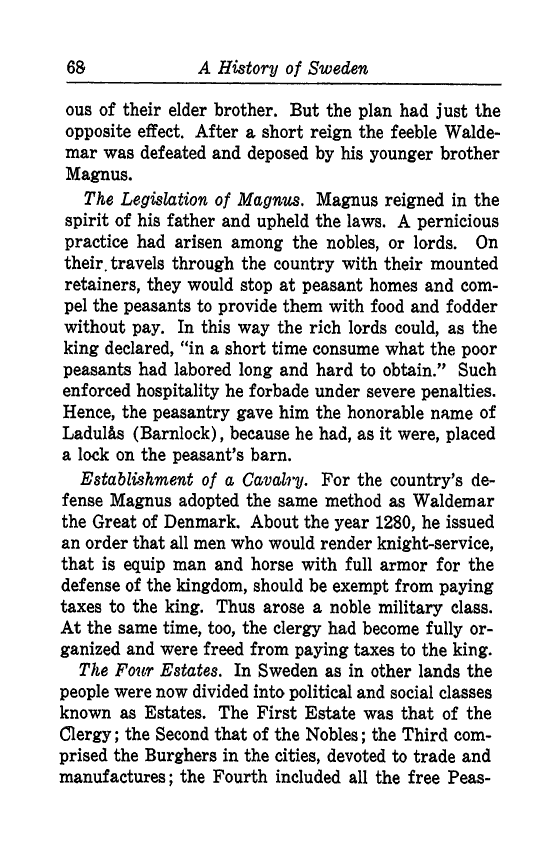
Full resolution (TIFF) - On this page / på denna sida - V. Later Catholic Period in Sweden - B. The Reign of Magnus Ladulås

<< prev. page << föreg. sida << >> nästa sida >> next page >>
Below is the raw OCR text
from the above scanned image.
Do you see an error? Proofread the page now!
Här nedan syns maskintolkade texten från faksimilbilden ovan.
Ser du något fel? Korrekturläs sidan nu!
This page has never been proofread. / Denna sida har aldrig korrekturlästs.
68 A History of Sweden
ous of their elder brother. But the plan had just the
opposite effect. After a short reign the feeble Walde-
mar was defeated and deposed by his younger brother
Magnus.
The Legislation of Magnus. Magnus reigned in the
spirit of his father and upheld the laws. A pernicious
practice had arisen among the nobles, or lords. On
their, travels through the country with their mounted
retainers, they would stop at peasant homes and com-
pel the peasants to provide them with food and fodder
without pay. In this way the rich lords could, as the
king declared, "in a short time consume what the poor
peasants had labored long and hard to obtain." Such
enforced hospitality he forbade under severe penalties.
Hence, the peasantry gave him the honorable name of
Ladulas (Barnlock), because he had, as it were, placed
a lock on the peasant’s barn.
Establishment of a Cavalry. For the country’s de-
fense Magnus adopted the same method as Waldemar
the Great of Denmark. About the year 1280, he issued
an order that all men who would render knight-service,
that is equip man and horse with full armor for the
defense of the kingdom, should be exempt from paying
taxes to the king. Thus arose a noble military class.
At the same time, too, the clergy had become fully or-
ganized and were freed from paying taxes to the king.
The Four Estates. In Sweden as in other lands the
people were now divided into political and social classes
known as Estates. The First Estate was that of the
Clergy ; the Second that of the Nobles ;
the Third com-
prised the Burghers in the cities, devoted to trade and
manufactures ;
the Fourth included all the free Peas-
<< prev. page << föreg. sida << >> nästa sida >> next page >>